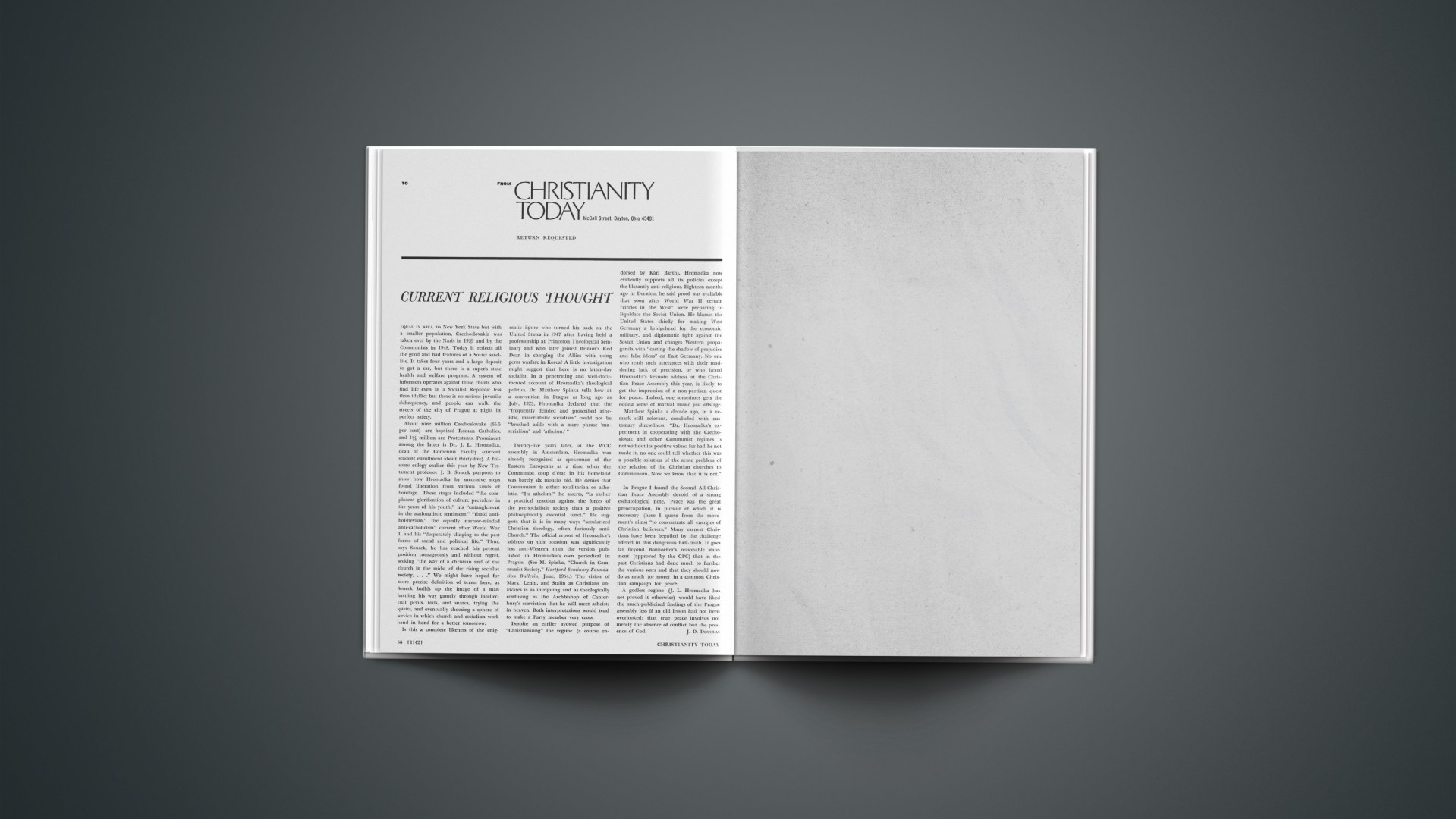Equal in area to New York State but with a smaller population, Czechoslovakia was taken over by the Nazis in 1939 and by the Communists in 1948. Today it reflects all the good and bad features of a Soviet satellite. It takes four years and a large deposit to get a car, but there is a superb state health and welfare program. A system of informers operates against those churls who find life even in a Socialist Republic less than idyllic; but there is no serious juvenile delinquency, and people can walk the streets of the city of Prague at night in perfect safety.
About nine million Czechoslovaks (65.5 per cent) are baptized Roman Catholics, and 1¼ million are Protestants. Prominent among the latter is Dr. J. L. Hromadka, dean of the Comenius Faculty (current student enrollment about thirty-five). A fulsome eulogy earlier this year by New Testament professor J. B. Soucek purports to show how Hromadka by successive steps found liberation from various kinds of bondage. These stages included “the complacent glorification of culture prevalent in the years of his youth,” his “entanglement in the nationalistic sentiment,” “timid anti-bolshevism,” the equally narrow-minded anti-catholicism” current after World War I, and his “desperately clinging to the past forms of social and political life.” Thus, says Soucek, he has reached his present position courageously and without regret, seeking “the way of a christian and of the church in the midst of the rising socialist society.…” We might have hoped for more precise definition of terms here, as Soucek builds up the image of a man battling his way gamely through intellectual perils, toils, and snares, trying the spirits, and eventually choosing a sphere of service in which church and socialism work hand in hand for a better tomorrow.
Is this a complete likeness of the enigmatic figure who turned his back on the United States in 1947 after having held a professorship at Princeton Theological Seminary and who later joined Britain’s Red Dean in charging the Allies with using germ warfare in Korea? A little investigation might suggest that here is no latter-day socialist. In a penetrating and well-documented account of Hromadka’s theological politics, Dr. Matthew Spinka tells how at a convention in Prague as long ago as July, 1923, Hromadka declared that the “frequently derided and proscribed atheistic, materialistic socialism” could not be “brushed aside with a mere phrase ‘materialism’ and ‘atheism.’ ”
Twenty-five years later, at the WCC assembly in Amsterdam, Hromadka was already recognized as spokesman of the Eastern Europeans at a time when the Communist coup d’état in his homeland was barely six months old. He denies that Communism is either totalitarian or atheistic. “Its atheism,” he asserts, “is rather a practical reaction against the forces of the pre-socialistic society than a positive philosophically essential tenet.” He suggests that it is in many ways “secularized Christian theology, often furiously anti-Church.” The official report of Hromadka’s address on this occasion was significantly less anti-Western than the version published in Hromadka’s own periodical in Prague. (See M. Spinka, “Church in Communist Society,” Hartford Seminary Foundation Bulletin, June, 1954.) The vision of Marx, Lenin, and Stalin as Christians unawares is as intriguing and as theologically confusing as the Archbishop of Canterbury’s conviction that he will meet atheists in heaven. Both interpretations would tend to make a Party member very cross.
Despite an earlier avowed purpose of “Christianizing” the regime (a course endorsed by Karl Barth), Hromadka now evidently supports all its policies except the blatantly anti-religious. Eighteen months ago in Dresden, he said proof was available that soon after World War II certain “circles in the West” were preparing to liquidate the Soviet Union. He blames the United States chiefly for making West Germany a bridgehead for the economic, military, and diplomatic fight against the Soviet Union and charges Western propaganda with “casting the shadow of prejudice and false ideas” on East Germany. No one who reads such utterances with their maddening lack of precision, or who heard Hromadka’s keynote address at the Christian Peace Assembly this year, is likely to get the impression of a non-partisan quest for peace. Indeed, one sometimes gets the oddest sense of martial music just offstage.
Matthew Spinka a decade ago, in a remark still relevant, concluded with customary shrewdness: “Dr. Hromadka’s experiment in cooperating with the Czechoslovak and other Communist regimes is not without its positive value: for had he not made it, no one could tell whether this was a possible solution of the acute problem of the relation of the Christian churches to Communism. Now we know that it is not.”
In Prague I found the Second All-Christian Peace Assembly devoid of a strong eschatological note. Peace was the great preoccupation, in pursuit of which it is necessary (here I quote from the movement’s aims) “to concentrate all energies of Christian believers.” Many earnest Christians have been beguiled by the challenge offered in this dangerous half-truth. It goes far beyond Bonhoeffer’s reasonable statement (approved by the CPC) that in the past Christians had done much to further the various wars and that they should now do as much (or more) in a common Christian campaign for peace.
A godless regime (J. L. Hromadka has not proved it otherwise) would have liked the much-publicized findings of the Prague assembly less if an old lesson had not been overlooked: that true peace involves not merely the absence of conflict but the presence of God.










